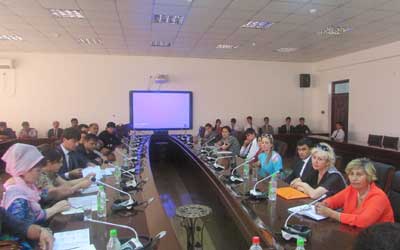News

The Family as a Social Institution
On May 15, 2015 at the initiative of the Humanities Department, Research Department and Education Department in honor of International Day of Family a meeting of aesthetic and educational circle on the theme «The family as a social institution» was held in FEIT. The academician of Academy of Sciences of the Republic of Tajikistan Sadullo Islomov and Head of the Institute of Economics and Demography of the Academy of Sciences of the Republic of Tajikistan, Akbar Subhon took part at the event.
Vice-rector on Educational work of FEIT Ilhomuddin Ibrohimov opened the circle. He noted in his speech that the family as unit of society throughout its existence represented a mass and sustained interest. Institution of the family has always been in the center of attention of researchers. I. Ibrohimov has introduced the guests to the participants and noticed that the family includes diverse components associated with demographic changes and the researchers will uncover the problem of family life in direct connection with these changes to participants of the circle.
The participants heard the reports: Islomova S.I. on theme «The essence of the family in the modern world», Subhonova A. on theme «Problems of modern family: marriage and divorce», lecturer of Humanities Department Tursunova A. on theme «Socio-psychological factors of development of family relations in the Republic of Tajikistan», 3rd year student of Finance and Credit Faculty on the theme «The main functions of the modern family», 1st year student of the Faculty of Accounting and Statistics on the theme «Problems of education in the works of Omar Khayyam».
It was noted that at the current stage of development of society, the family has a specific social and economic characteristics. Speaking on the effects of labor migration in Tajikistan, it should be noted that if on the one hand it solves the economic problems in the family, on the other hand - has made many families defective and broken due to the lack of long-term absence of men. Labor migration exists in all countries, regardless of their level of economic development. According to official statistics, in 2013 about 799,000 people left for labor migration from Tajikistan, whose average age is between 22 to 30 years. According to experts, economic, social and psychological factors affect to the disintegration of the young families in Tajikistan, including a low standard of living, leaving men in labor migration, unemployment, change in traditional family values, no respect for social and ethical standards, lack of family involvement in education the younger generation, young people unprepared for an independent family life etc.
The teachers of the Humanities department Ubaydullo Saburov, Faridun Safarzoda took part at the discussion. They noted that the best option of family relations can be called traditional oriental family.
Mashhura Abdulloeva

